冀教版七年级下英语知识点总结unit1
冀教版英语七年级下册Unit 1 Lesson1知识点

冀教版英语七年级下册Unit 1 Lesson1知识点Lesson 1: A Trip to ChinaIn this lesson。
we will focus on some key phrases and XXX related to learning about China and taking a trip there.Key Phrases:1) "Learn about" means to study or understand something。
You can "learn from" someone or "learn to do" something.2) "Send" XXX means to mail or XXX "sent." You can "send someone something" or "send something to XXX."3) "Tell" means to inform or share n with someone。
You can "tell someone something" or "tell something to XXX."4) "Think about" means to consider or have an n about something.5) "What does [someone] think about [something]?" is a n you can use to ask for XXX.6) "Note" XXX or a piece of paper used for writing down n。
七年级英语下册 Unit 1 A Trip to Beijing 单元知识点归纳 冀教版
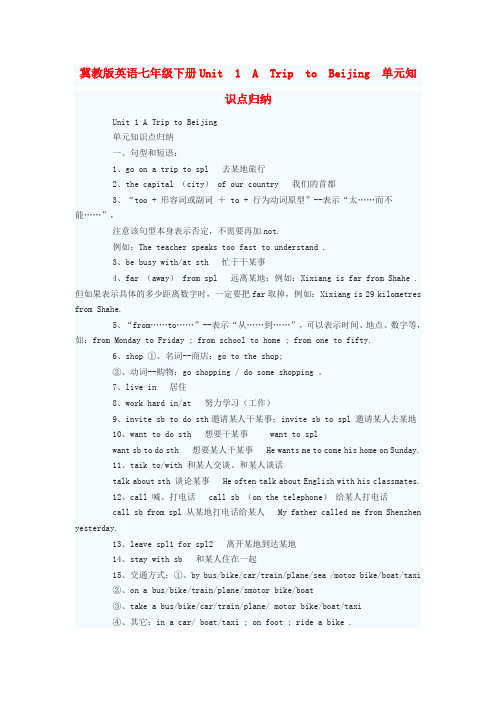
冀教版英语七年级下册Unit 1 A Trip to Beijing 单元知识点归纳Unit 1 A Trip to Beijing单元知识点归纳一、句型和短语:1、go on a trip to spl 去某地旅行2、the capital (city) of our country 我们的首都3、“too + 形容词或副词+ to + 行为动词原型”--表示“太……而不能……”,注意该句型本身表示否定,不需要再加not.例如:The teacher speaks too fast to understand .3、be busy with/at sth 忙于干某事4、far (away) from spl 远离某地;例如:Xixiang is far from Shahe .但如果表示具体的多少距离数字时,一定要把far取掉,例如:Xixiang is 29 kilometres from Shahe.5、“from……to……”--表示“从……到……”,可以表示时间、地点、数字等,如:from Monday to Friday ; from school to home ; from one to fifty.6、shop ①、名词--商店:go to the shop;②、动词--购物:go shopping / do some shopping 。
7、live in 居住8、work hard in/at 努力学习(工作)9、invite sb to do sth邀请某人干某事;invite sb to spl 邀请某人去某地10、want to do sth 想要干某事 want to splwant sb to do sth 想要某人干某事 He wants me to come his home on Sunday.11、taik to/with 和某人交谈、和某人谈话talk about sth 谈论某事 He often talk about English with his classmates.12、call 喊、打电话 call sb (on the telephone)给某人打电话call sb from spl 从某地打电话给某人 My father called me from Shenzhen yesterday.13、leave spl1 for spl2 离开某地到达某地14、stay with sb 和某人住在一起15、交通方式:①、by bus/bike/car/train/plane/sea /motor bike/boat/taxi②、on a bus/bike/train/plane/smotor bike/boat③、take a bus/bike/car/train/plane/ motor bike/boat/taxi④、其它:in a car/ boat/taxi ; on foot ; ride a bike .16、plan 名词--计划: make a plan for sth 为某事制定计划;动词--计划:plan (for) sth为某事做计划;plan to do sth 计划干某事。
冀教版英语七年级下册Unit 1 A Trip to the Silk Road课文要点解析
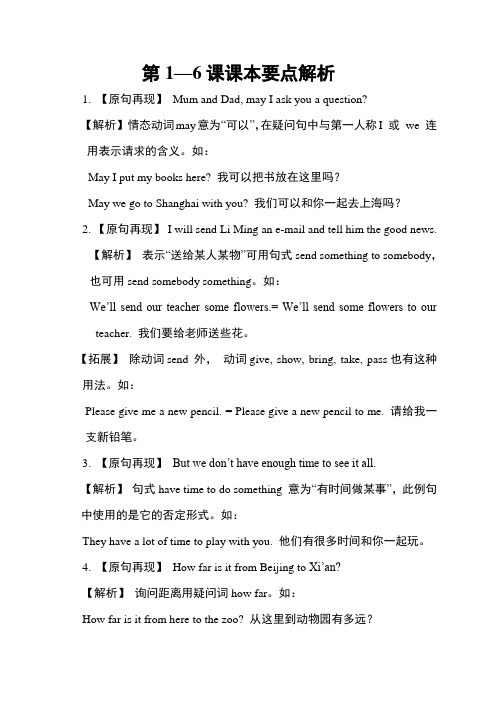
第1—6课课本要点解析1. 【原句再现】Mum and Dad, may I ask you a question?【解析】情态动词may意为“可以”,在疑问句中与第一人称I 或we 连用表示请求的含义。
如:May I put my books here? 我可以把书放在这里吗?May we go to Shanghai with you? 我们可以和你一起去上海吗?2. 【原句再现】I will send Li Ming an e-mail and tell him the good news.【解析】表示“送给某人某物”可用句式send something to somebody,也可用send somebody something。
如:We’ll send our teacher some flowers.= We’ll send some flowers to our teacher. 我们要给老师送些花。
【拓展】除动词send 外,动词give, show, bring, take, pass也有这种用法。
如:Please give me a new pencil. = Please give a new pencil to me. 请给我一支新铅笔。
3. 【原句再现】But we don’t have enough time to see it all.【解析】句式have time to do something 意为“有时间做某事”,此例句中使用的是它的否定形式。
如:They have a lot of time to play with you. 他们有很多时间和你一起玩。
4. 【原句再现】How far is it from Beijing to Xi’an?【解析】询问距离用疑问词how far。
如:How far is it from here to the zoo? 从这里到动物园有多远?【拓展】how long用于询问长度或时间长短。
冀教版英语七年级下册Unit 1 A Trip to the Silk Road单元知识点归纳总结
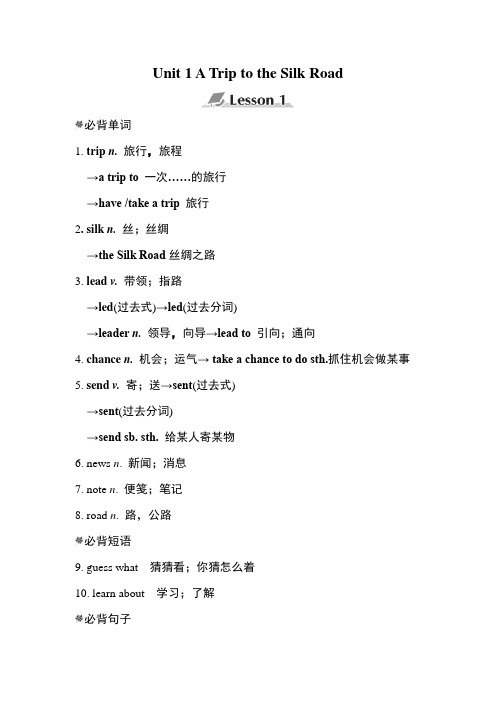
Unit 1 A Trip to the Silk Road必背单词1. trip n.旅行,旅程→a trip to 一次……的旅行→have /take a trip 旅行2. silk n.丝;丝绸→the Silk Road丝绸之路3. lead v. 带领;指路→led(过去式)→led(过去分词)→leader n. 领导,向导→lead to 引向;通向4. chance n.机会;运气→ take a chance to do sth.抓住机会做某事5. send v.寄;送→sent(过去式)→sent(过去分词)→send sb. sth. 给某人寄某物6. news n. 新闻;消息7. note n. 便笺;笔记8. road n. 路,公路必背短语9. guess what 猜猜看;你猜怎么着10. learn about 学习;了解必背句子11. We're learning about the Silk Road this month in school.在学校我们这个月学习丝绸之路。
12. May I go with them?我可以和他们一起去吗?13. Who will lead the trip?谁将带领这次旅行?必背单词1. exciting adj.使人激动的(用来修饰物)→excited adj.感到兴奋的(用来修饰人)2. along prep.沿着……→walk along 沿着……走3. arrive v.到达,抵达→arrive in 到达(大地点)→arrive at 到达(小地点)4. leave v.动身;出发;离开→left(过去式)→left(过去分词)→leave for sp. 前往某地;动身去某地5. kilometer n. 千米;公里6. special adj.特殊的;特别的必背短语7. plan for the trip 关于旅行的计划8. come back to 回……必背句子9. How exciting!多么令人激动!10. How far is it from Beijing to Xi'an?从北京到西安多远?11. But we don't have enough time to see it all.但是我们没有足够时间去看它的全貌。
冀教版英语七年级下册Unit 1 Lesson1知识点
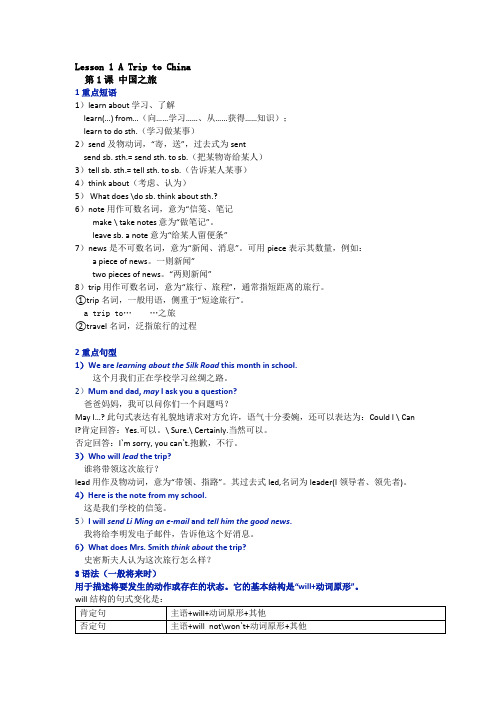
Lesson 1 A Trip to China第1课中国之旅1重点短语1)learn about 学习、了解learn(…) from…(向……学习……、从……获得……知识);learn to do sth.(学习做某事)2)send及物动词,“寄,送”,过去式为sentsend sb. sth.= send sth. to sb.(把某物寄给某人)3)tell sb. sth.= tell sth. to sb.(告诉某人某事)4)think about(考虑、认为)5) What does \do sb. think about sth.?6)note用作可数名词,意为“信笺、笔记make \ take notes 意为“做笔记”。
leave sb. a note 意为“给某人留便条”7)news是不可数名词,意为“新闻、消息”。
可用piece表示其数量,例如:a piece of news。
一则新闻”two pieces of news。
“两则新闻”8)trip用作可数名词,意为“旅行、旅程”,通常指短距离的旅行。
①trip名词,一般用语,侧重于“短途旅行”。
a trip to… …之旅②travel名词,泛指旅行的过程2重点句型1)We are learning about the Silk Road this month in school.这个月我们正在学校学习丝绸之路。
2)Mum and dad, may I ask you a question?爸爸妈妈,我可以问你们一个问题吗?May I…?此句式表达有礼貌地请求对方允许,语气十分委婉,还可以表达为:Could I \ Can I?肯定回答:Yes.可以。
\ Sure.\ Certainly.当然可以。
否定回答:I`m sorry, you can`t.抱歉,不行。
3)Who will lead the trip?谁将带领这次旅行?lead用作及物动词,意为“带领、指路”。
冀教版英语七下第一单元知识点

Unit 1 单元知识点Lesson 1 A Trip to China 1.We ’re learning about the Silk Road this month in school.learn v. ________learn about ________,_______,_______learn from _______,_______ eg. The students _____________ Chinese history last week.上星期学生们学生们学习了中国历史。
2.May I ask you a question?情态动词(may,can,must...)+ doMay I...?表示“_________”用来征求对方同意。
May 是情态动词,后跟第一人称 I 或 we .否定回答 No,________./Sorry,______________./______________.eg. ______ go to the park? 我可以去公园吗?3.My school is planning a trip around China with Li Ming’s school.n.计划,打算 make a plan for 为...制定计划v.计划,打算 ______________ 计划做某事eg. He ________ visit his uncle next month. 他计划下个月拜访他的叔叔。
4.Who will lead the trip?lead v._______,_____________...___... 把...带到...eg. Who will lead the trip? 谁将带领这次旅行?I will ______ you ___ the waiting room. 我将带你到等候室。
5.I will send Li Ming an e-mail and tell him the good news.班级__________姓名__________①send v. ______,______send sb.sth. = send ____ ____ ____ 给某人送某物eg.I want to send my mother a letter.= I want to send a letter to my mother.②news n.新闻,消息______名词I have some good news. 一则新闻_________ news两则新闻_________ news6.Is the Silk Road made of silk?由...制成be made ______(看出原材料-物理变化)be made ______ (看不出原材料-化学变化)eg. Books are made ___ paper. 书由纸制成。
冀教版七年级下英语知识点总结unit1

1、 learn about学、认识(1)、learn(⋯ ) from ⋯(向⋯⋯学⋯⋯、从⋯⋯得⋯⋯知)(2)、learn to do sth、学做某事learn to swim 学游泳learn to ride a bike 学自行(3)、the Silk Road2、May I ⋯? 此句式表达有礼貌地求方允,气十分委宛,能够表达:Could I \ CanI?其一定回答常用: Yes、能够。
\ Sure、\ Certainly、自然能够。
否认回答: I`m sorry, you can`t、对不起,不可以。
\I`m sorry, but⋯对不起,但⋯⋯ \ You`d better not、您最好。
3、 lead 用作及物,意“ 、指路”。
其去式 led,名 leader(l 者、先者 )。
4、 note 用作可数名,意“信、笔”。
(1)、make \ take notes 意“做笔”。
(2)、leave sb、 a note 意“ 某人留条子”。
5、 send 及物,“寄,送”,去式 sent。
send sb、 sth、= send sth、 to sb、意“把某物寄某人”(1)、tell sb、 sth、= tell sth、 to sb、意“告某人某事”6、 think about 意“考,” ,about 就是介,后可跟名、代或v、-ing 形式。
7、 trip 用作可数名,意“旅行、旅途” ,往常指短距离得旅行。
①t rip 名,一般用,重于“短途旅行”。
②travel 名,泛指旅行得程8、 around 用作介,意“遍布、全” ,后跟表示地址得名, around China 意“中国各地”,相当于 all over China。
9、 will 构得句式化就是:一定句主 +will+ 原形 +其她否认句主 +will not\won`t+ 原形 +其她Will + 主 +原形 +其她?一般一定答: Yes, 主 +will 、疑句否认答: No, 主 +won`t、特别疑句特别疑句 +will+ 主 +原形 +其她?10、news 就是不可以数名,意“新、信息”。
初中英语七年级下册Unit1知识点总结 冀教版
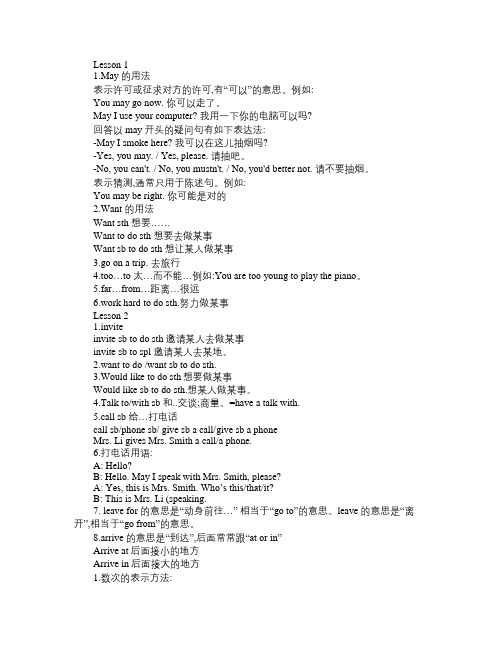
Lesson 11.May 的用法表示许可或征求对方的许可,有“可以”的意思。
例如:You may go now. 你可以走了。
May I use your computer? 我用一下你的电脑可以吗?回答以may 开头的疑问句有如下表达法:-May I smoke here? 我可以在这儿抽烟吗?-Yes, you may. / Yes, please. 请抽吧。
-No, you can't. / No, you mustn't. / No, you'd better not. 请不要抽烟。
表示猜测,通常只用于陈述句。
例如:You may be right. 你可能是对的2.Want 的用法Want sth 想要……Want to do sth 想要去做某事Want sb to do sth 想让某人做某事3.go on a trip. 去旅行4.too…to 太…而不能…例如:You are too young to play the piano。
5.far…from…距离…很远6.work hard to do sth.努力做某事Lesson 21.inviteinvite sb to do sth 邀请某人去做某事invite sb to spl 邀请某人去某地。
2.want to do /want sb to do sth.3.Would like to do sth想要做某事Would like sb to do sth.想某人做某事。
4.Talk to/with sb 和..交谈;商量。
=have a talk with.5.call sb 给…打电话call sb/phone sb/ give sb a call/give sb a phoneMrs. Li gives Mrs. Smith a call/a phone.6.打电话用语:A: Hello?B: Hello. May I speak with Mrs. Smith, please?A: Yes, this is Mrs. Smith. Who’s this/that/it?B: This is Mrs. Li (speaking.7. leave for 的意思是“动身前往…” 相当于“go to”的意思。
七年级英语下册Unit1重要短语汇总(冀教版)
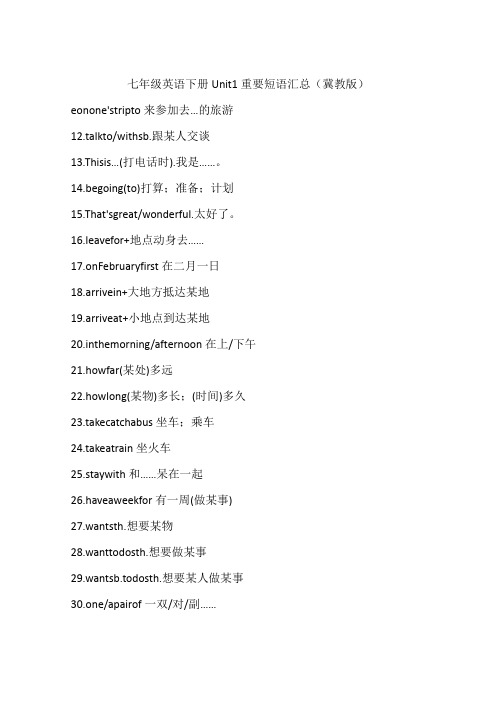
七年级英语下册Unit1重要短语汇总(冀教版)eonone'stripto来参加去…的旅游12.talkto/withsb.跟某人交谈13.Thisis…(打电话时).我是……。
14.begoing(to)打算;准备;计划15.That'sgreat/wonderful.太好了。
16.leavefor+地点动身去……17.onFebruaryfirst在二月一日18.arrivein+大地方抵达某地19.arriveat+小地点到达某地20.inthemorning/afternoon在上/下午21.howfar(某处)多远22.howlong(某物)多长;(时间)多久23.takecatchabus坐车;乘车24.takeatrain坐火车25.staywith和……呆在一起26.haveaweekfor有一周(做某事)27.wantsth.想要某物28.wanttodosth.想要做某事29.wantsb.todosth.想要某人做某事30.one/apairof一双/对/副……31.needmoresth.需要更多某物32.Alldone!全部做完!33.atthetrainstation在火车站34.Haveagoodtrip!旅途愉快!35.walkto…走路去……36.thereis/are…(在某处)有……37.runto…向……跑去38.jumpon跳上去39.beready准备好40.beexcited很兴奋/激动41.lovedoingsth.喜爱做某事42.Don'tdosth.!别做某事!43.sitdown坐下44.standup站起来45.packsth.打包某物46.writehome给家人写信47.saysth.about…说说有关……的情况48.beforeatrip旅行前49.havefun(in)doingsth.做某事很有趣50.onFebruaryfirstinthemorning=inthemorningonFebruaryfirst=onthemorningofFebruaryfirst 在二月一日的早上。
冀教版七年级下英语各单元知识点总结
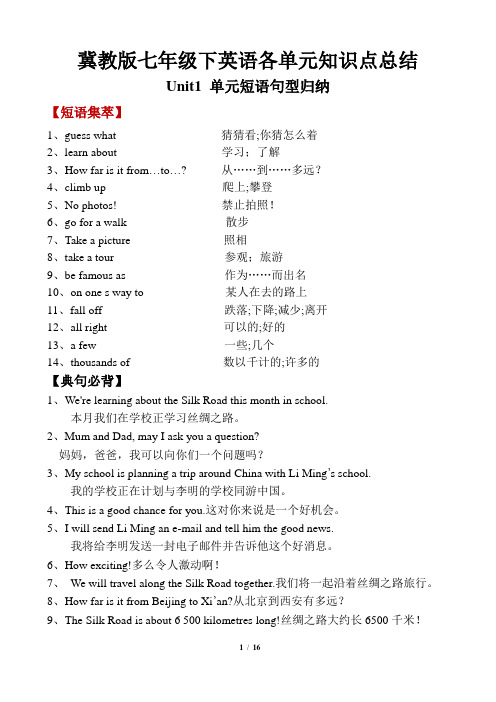
冀教版七年级下英语各单元知识点总结Unit1 单元短语句型归纳【短语集萃】1、guess what 猜猜看;你猜怎么着2、learn about 学习;了解3、How far is it from…to…? 从……到……多远?4、climb up 爬上;攀登5、No photos! 禁止拍照!6、go for a walk 散步7、Take a picture 照相8、take a tour 参观;旅游9、be famous as 作为……而出名10、on one s way to 某人在去的路上11、fall off 跌落;下降;减少;离开12、all right 可以的;好的13、a few 一些;几个14、thousands of 数以千计的;许多的【典句必背】1、We're learning about the Silk Road this month in school.本月我们在学校正学习丝绸之路。
2、Mum and Dad, may I ask you a question?妈妈,爸爸,我可以向你们一个问题吗?3、My school is planning a trip around China with Li Ming’s school.我的学校正在计划与李明的学校同游中国。
4、This is a good chance for you.这对你来说是一个好机会。
5、I will send Li Ming an e-mail and tell him the good news.我将给李明发送一封电子邮件并告诉他这个好消息。
6、How exciting!多么令人激动啊!7、We will travel along the Silk Road together.我们将一起沿着丝绸之路旅行。
8、How far is it from Beijing to Xi’an?从北京到西安有多远?9、The Silk Road is about 6 500 kilometres long!丝绸之路大约长6500千米!10、But we don’t have enough time to see it all.但我们没有足够的时间把它全部看完。
冀教版七年级英语下册Unit 1 知识清单
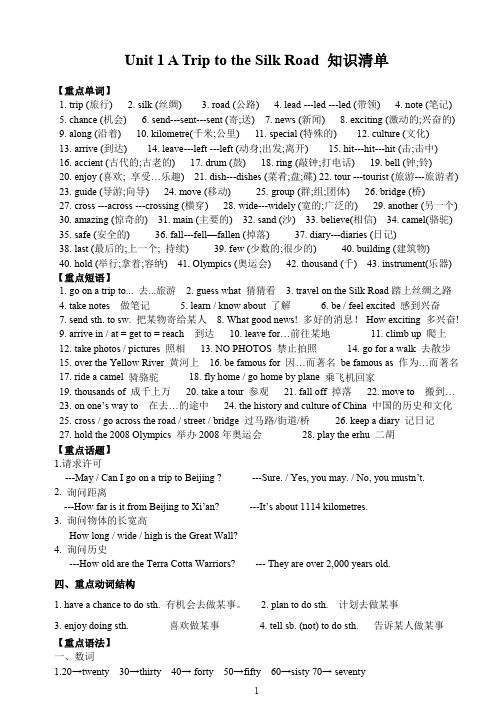
Unit 1 A Trip to the Silk Road 知识清单【重点单词】1. trip (旅行)2. silk (丝绸)3. road (公路)4. lead ---led ---led (带领) 4. note (笔记)5. chance (机会)6. send---sent---sent (寄;送)7. news (新闻)8. exciting (激动的;兴奋的)9. along (沿着) 10. kilometre(千米;公里) 11. special (特殊的) 12. culture (文化)13. arrive (到达) 14. leave---left ---left (动身;出发;离开) 15. hit---hit---hit (击;击中) 16. accient (古代的;古老的) 17. drum (鼓) 18. ring (敲钟;打电话) 19. bell (钟;铃)20. enjoy (喜欢; 享受…乐趣) 21. dish---dishes (菜肴;盘;碟) 22. tour ---tourist (旅游---旅游者) 23. guide (导游;向导) 24. move (移动) 25. group (群;组;团体) 26. bridge (桥)27. cross ---across ---crossing (横穿) 28. wide---widely (宽的;广泛的) 29. another (另一个) 30. amazing (惊奇的) 31. main (主要的) 32. sand (沙) 33. believe(相信) 34. camel(骆驼) 35. safe (安全的) 36. fall---fell—fallen (掉落) 37. diary---diaries (日记)38. last (最后的;上一个; 持续) 39. few (少数的;很少的) 40. building (建筑物)40. hold (举行;拿着;容纳) 41. Olympics (奥运会) 42. thousand (千) 43. instrument(乐器) 【重点短语】1. go on a trip to... 去...旅游2. guess what 猜猜看3. travel on the Silk Road踏上丝绸之路4. take notes 做笔记5. learn / know about 了解6. be / feel excited 感到兴奋7. send sth. to sw. 把某物寄给某人8. What good news! 多好的消息!How exciting 多兴奋!9. arrive in / at = get to = reach 到达10. leave for…前往某地11. climb up 爬上12. take photos / pictures 照相13. NO PHOTOS 禁止拍照14. go for a walk 去散步15. over the Yellow River 黄河上16. be famous for 因…而著名be famous as 作为…而著名17. ride a camel 骑骆驼18. fly home / go home by plane 乘飞机回家19. thousands of 成千上万20. take a tour 参观21. fall off 掉落22. move to 搬到…23. on one’s way to 在去…的途中24. the history and culture of China 中国的历史和文化25. cross / go across the road / street / bridge 过马路/街道/桥26. keep a diary 记日记27. hold the 2008 Olympics 举办2008年奥运会28. play the erhu 二胡【重点话题】1.请求许可---May / Can I go on a trip to Beijing ? ---Sure. / Yes, you may. / No, you mustn’t.2. 询问距离---How far is it from Beijing to Xi’an? ---It’s about 1114 kilometres.3. 询问物体的长宽高How long / wide / high is the Great Wall?4. 询问历史---How old are the Terra Cotta Warriors? --- They are over 2,000 years old.四、重点动词结构1. have a chance to do sth. 有机会去做某事。
202X年冀教版七年级英语下册第一单元知识点总结

千里之行,始于足下。
202X年冀教版七年级英语下册第一单元知识点总结202X年冀教版七年级英语下册第一单元知识点总结如下:1. 词汇:- 单词:welcome, aboard, afraid, excited, a few, expect, capital, country, spend, beach, conversation, arrive, movie, city, Europe, plus, fast, past, change, star, interesting- 词组:go fishing, go shopping, go for a walk, go swimming, go boating, go hiking2. 语法:- 现在进行时:主语+be动词(am, is, are)+动词的现在分词- 一般将来时:主语+will+动词原形- 数字的表达方式:基数词+名词单数形式(如:two days,three books)3. 句型:- Wh-疑问句:Wh-词+be动词+主语+动词的现在分词(如:What are you doing?)- 反意疑问句:陈述句+is, are, am not,疑问句部分与陈述句相反(如:You are swimming, aren't you?)4. 运用:- 描述正在进行的动作(现在进行时):I am watching TV now.- 表达将来的计划(一般将来时):I will go swimming tomorrow.第1页/共2页锲而不舍,金石可镂。
- 询问别人的行为或安排(Wh-疑问句):What are you doing in the park?- 征询对方的意见或确认信息(反意疑问句):You are going to the beach this weekend, aren't you?- 表达自己的期望或喜好:I expect to visit Beijing.以上就是202X年冀教版七年级英语下册第一单元知识点的总结。
冀教版七年级下英语第一单元教材知识详解

冀教版七年级下英语第一单元教材知识详解Unit1 SectionA教材知识详解1、What do you think of talk shows?你觉得谈话节目怎么样?(课本第1页)本句是由what引导的特殊疑问句。
用来征询对方对某人某事的看法。
也可表示为:How do you like talk shows?What do you think of the Chinese food?=How do you like the Chinese food?你认为中国菜怎么样?【例题】How does she like sitcoms?(改为同义句)______ ______ she ______ ______ sitcoms?点拨:How does she like...?=What does she think of...?句意为“她觉得情景喜剧怎样?”。
答案:What does;think of2、I don't mind them.我不介意。
(课本第1页)mind v. 介意,通常用于疑问句、否定句中。
可单独使用,也可跟名词、代词或动词-ing形式。
I'm late.I hope you don't mind.我来晚了,希望你不要介意。
Do you mind going with me?你介意跟我一起去吗?mind可构成句型:Do/Would you mind+物主代词/代词的宾格+doing sth.?意为“你介意某人做某事吗?”Would you mind my/me opening the door?你介意我把门打开吗?mind n.意见;头脑;心智He wants to change his mind. 他想改变主意。
Eating many walnuts is good for your mind.多吃核桃对你的头脑有益。
【例1】Would you mind my ______ basketball in the garden? A.playing B.playedC.to play D.plays点拨:Would you mind+物主代词/代词的宾格+doing sth.?意为“你介意某人做某事吗?”答案:A【例2】I don't ______ if he can change his ______.A.mind;mind B.mind;minds C.minds;mind D.minds;minds点拨:don't后接动词原形,排除C、D两项;his是形容词性物主代词,后接名词。
冀教版7年级英语下册Unit 1 知识点汇总
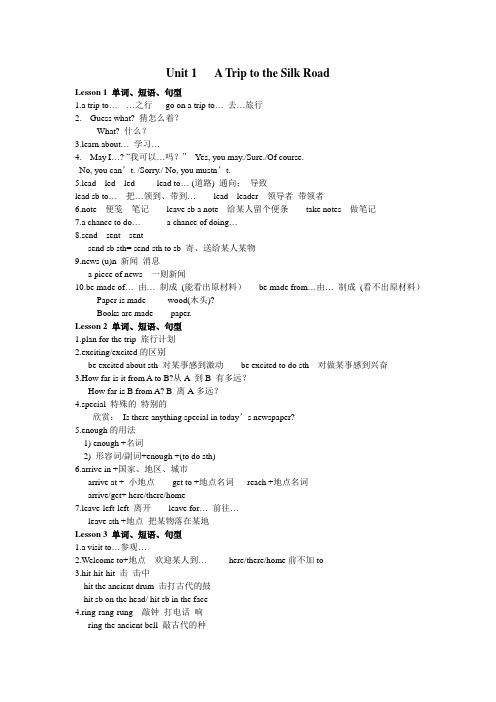
Unit 1 A Trip to the Silk RoadLesson 1 单词、短语、句型1.a trip to……之行go on a trip to…去…旅行2.---Guess what? 猜怎么着?---What? 什么?3.learn about…学习…4.---May I…? “我可以…吗?”---Yes, you may./Sure./Of course.No, you can’t. /Sorry./ No, you mustn’t.5.lead---led---led lead to… (道路) 通向;导致lead sb to…把…领到、带到…lead---leader 领导者带领者6.note 便笺笔记leave sb a note 给某人留个便条take notes 做笔记7.a chance to do… a chance of doing…8.send---sent---sentsend sb sth= send sth to sb 寄、送给某人某物9.news (u)n 新闻消息a piece of news 一则新闻10.be made of…由…制成(能看出原材料)be made from…由…制成(看不出原材料)Paper is made ____ wood(木头)?Books are made ___ paper.Lesson 2 单词、短语、句型1.plan for the trip 旅行计划2.exciting/excited的区别be excited about sth 对某事感到激动be excited to do sth 对做某事感到兴奋3.How far is it from A to B?从A 到B 有多远?How far is B from A? B 离A多远?4.special 特殊的特别的欣赏:Is there anything special in today’s newspaper?5.enough的用法1) enough +名词2) 形容词/副词+enough +(to do sth)6.arrive in +国家、地区、城市arrive at + 小地点get to +地点名词reach +地点名词arrive/get+ here/there/home7.leave-left-left 离开leave for…前往…leave sth +地点把某物落在某地Lesson 3 单词、短语、句型1.a visit to…参观…2.Welcome to+地点欢迎某人到…here/there/home前不加to3.hit-hit-hit 击击中hit the ancient drum 击打古代的鼓hit sb on the head/ hit sb in the face4.ring-rang-rung 敲钟打电话响ring the ancient bell 敲古代的种ring sb up 给某人打电话ring back 回电话5. enjoy the special dishes 享受西安的特色小吃enjoy oneself= have a good time/have fun enjoy doing sth 喜欢做…6. dish-dishes(复) 盘,碟,菜肴,一道菜wash the dishes 清洗餐具cold dishes 凉菜7. tour guide 导游8. No photos! 禁止拍照!Lesson 4 单词、短语、句型1.group 群组团体强调整体时,为单数;强调成员时,视为复数。
七年级下册冀教版英语第一课知识点

七年级下册冀教版英语第一课知识点Knowledge Points of Grade 7, Volume 1 of Ji Edition English Lesson 1In the first lesson of Grade 7, Volume 1 of the Ji Edition English textbook, students will learn about greetings, introductions, and expressions of gratitude and apology. This lesson introduces basic conversational English that students can use in everyday interactions.1. Greetings:- Hello: A common greeting to begin a conversation.- Hi: A more casual greeting often used among friends or peers.- Good morning/afternoon/evening: Greetings used at specific times of the day.- How are you?: A common question to ask about someone's well-being.2. Introductions:- What's your name?: A question used to ask someone's name.- My name is…: A response to the question "What's your name?"- Nice to meet you: A polite expression when meeting someone for the first time.- Where are you from?: A question to ask about someone's nationality or place of origin.3. Expressions of Gratitude:- Thank you: A polite way to show appreciation.- You're welcome: A response to show that you are happy to help.- Thanks a lot: A more casual way to express gratitude.- I appreciate it: A formal way to show gratitude.4. Expressions of Apology:- I'm sorry: A way to apologize for something you have done.- Excuse me: A polite way to interrupt someone or get their attention.- Sorry for the mistake: Apologizing for making a mistake.- Please forgive me: A more formal way to ask for forgiveness.These basic conversational phrases are essential for students to communicate effectively in English-speaking environments. By mastering these knowledge points, students will be able to greet others, introduce themselves, show gratitude, and apologize in various situations.In addition to these language points, students will also learn about cultural differences in greetings, introductions, and expressions of gratitude and apology. Understanding these cultural nuances will help students communicate with people from different backgrounds and develop cross-cultural communication skills.Overall, the first lesson of Grade 7, Volume 1 of the Ji Edition English textbook provides students with a solid foundation in basic conversational English that they can use in their daily lives. By practicing these knowledge points, students will improve their English language skills and enhance their ability to communicate effectively in a globalized world.。
- 1、下载文档前请自行甄别文档内容的完整性,平台不提供额外的编辑、内容补充、找答案等附加服务。
- 2、"仅部分预览"的文档,不可在线预览部分如存在完整性等问题,可反馈申请退款(可完整预览的文档不适用该条件!)。
- 3、如文档侵犯您的权益,请联系客服反馈,我们会尽快为您处理(人工客服工作时间:9:00-18:30)。
1、learn about学习、了解
(1).learn(…) from…(向……学习……、从……获得……知识)
(2).learn to do sth. 学习做某事
learn to swim 学习游泳learn to ride a bike 学习骑自行车
(3).the Silk Road
2、May I…? 此句式表达有礼貌地请求对方允许,语气十分委婉,还可以表达为:Could I \ Can I?其肯定回答常用:Yes.可以。
\ Sure.\ Certainly.当然可以。
否定回答为:I`m sorry, you can`t.抱歉,不行。
\I`m sorry, but…抱歉,但……\ You`d better not. 你最好别这样。
3、lead用作及物动词,意为“带领、指路”。
其过去式led,名词为leader(l领导者、领先者)。
4、note用作可数名词,意为“信笺、笔记”。
(1).make \ take notes 意为“做笔记”。
(2).leave sb. a note 意为“给某人留便条”。
5、send及物动词,“寄,送”,过去式为sent。
send sb. sth.= send sth. to sb.意为“把某物寄给某人”
(1).tell sb. sth.= tell sth. to sb. 意为“告诉某人某事”
6、think about意为“考虑,认为”,about是介词,后可跟名词、代词或v.-ing 形式。
7、trip用作可数名词,意为“旅行、旅程”,通常指短距离的旅行。
①trip名词,一般用语,侧重于“短途旅行”。
②travel名词,泛指旅行的过程
8、around用作介词,意为“遍及、全”,后跟表示地点的名词,around China意为“中国各地”,相当于all over China。
9、will结构的句式变化是:
10、news是不可数名词,意为“新闻、消息”。
可用piece表示其数量,例如:
“一则新闻” a piece of news。
“两则新闻” two pieces of news。
11、the Silk Road 丝绸之路the是定冠词,此处用在由普通名词组成的专有名词前。
the Great Wall 长城
the Summer Palace 颐和园
12、chance用作可数名词,意为“机会、运气”。
have a chance to do sth.= have a chance of doing sth. 意为“有机会做某事”,by chance意为“偶然地”。
13、问两地之间的距离有多远时,用“How far is it from…to…?”,还可以使用“How far away is…from…?”或“How many kilometres is it from…to…?”。
①how far问距离有多远。
②how long问时间多久、多长,还可以提问物体的长度。
14、from…to…
①表示从某一地方到另一地方。
例如:
from China to Canada
②表示从某一时间到另一时间。
例如:
He often watches TV from seven o`clock to nine o`clock in the evening.
15、arrive意为“到达”。
当表示到达某地时,arrive后要加介词in或at。
到达较大的地方,如北京、上海等用in;到达较小的地方,如车站、学校、等用at。
当arrive 后接home、there、here等地点副词时,需去掉介词。
16、come back意为“回来”。
例如:
②leave用作及物动词,过去式为left,意为“离开、动身、出发”;leave for…意为“动身去……”,for后的名词是目的地。
17、also用作副词,意为“也”。
ring用作及物动词,意为“敲(钟)、打电话、按(铃)”;用作不及物动词,意为“鸣;响”。
其过去式为rang。
Ring用作名词,意为“戒指、环、圈”。
18、no+名词或动名词,表示“禁止做某事”,常用于公共场合,提醒人们注意,no在此处意为“不准、不许。
(1).enjoy用作及物动词,意为“喜欢、享受”。
其后可接名词、代词和动名词,但不能接动词不定式。
enjoy doing sth喜欢做某事enjoy oneself玩的开心
19、go for a walk意为“去散步”。
go for +a\an+n.意为“去做某事”。
类似的短语还有go for a swim去游泳,go for a drive开车兜风。
例如:.
(2).walk名词,意为“散步”。
20.cross作及物动词,意为“横跨、横穿”,与go across的意思相同,指从一边横跨到另一边去。
例如:cross the river 过河cross the road 过马路
21、take a pictur e意为“照相”,相当于take a photo,复数为:take pictures、take photos其后可接of,表示“给某人照相”。
22、What does\do…mean?=What does\do…mean by…?=What`s the meaning of…?表示“……是什么意思?”what does it mean in English?
23.go down表示“沿着……走”,同义短语有go along、walk along、walk down、go down。
24.turn left意为“向左拐”。
其中turn是动词,意为“转弯”。
turn on 打开turn off 关闭turn down 开小、调低turn up 开大、调高
25、take a tour意为“参观、旅游”,相当于make a tour作可数名词,意为“旅游、游行”,
指为考察、观光等巡回各地的旅行。
26、be famous as…意为“作为……而出名”。
be famous as…作为……而出名Edison is famous as an inventor.
be famous for…因……而出名China is famous for the Great Wall.
动词不定式短语to see the ancient paintings in the Mogao Caves作状语,表示目的。
27、Believe作及物动词,意为“相信”。
其后可接名词、代词作宾语,也可接that引导的宾语从句。
当believe后宾语从句且主句主语为第一人称时,其否定结构应否定在believe上。
I believe he is an honest man.
I don`t believe he is an honest man.
28、on one`s way to…意为“在某人去……的路上”。
当后接here、there或home时,要省去介词to。
29、Fall作不及物动词,意为“落下、跌倒”,其过去式为fell。
fall off为固定短语,意为“跌落、下降、减少、离开”。
fall behind落在(…的)后面,跟不上
fall into…落入……中
fall down跌倒、掉下
fall asleep入睡、熟睡
30、Last作形容词,意为“最后的、最末的、末尾的”。
(1).last作形容词,意为“最近的、上一个的”,只能放在名词之前。
last week上周last night昨天晚上
st作副词,意为“最后、最近一次”
31、fly to…意为“飞行……,乘飞机去……”,相当于go to…by plane\air,其后接地点副词(here、there、home)时,须去掉to,fly的过去式为flew。
32、clothing作不可数名词,意为“衣物”,是服装的总称,除衣裤外还包括帽子、鞋袜等,没有复数形式。
表示“一件衣服”,要说an article\piece of clothing。
clothes意为“衣服”,统指身上穿的各种服装(包括上衣、裤子、内衣等),是复数名词,不能与数词直接连用。
例如:
Our art teacher often wears beautiful clothes.
33、a few意为“一些,几个”,其后接可数名词复数。
34、look for意为“寻找”,强调寻找的动作;find表示寻找的结果,意为“找到”。
look after照看
look out当心
look like看起来像
look up查找
look at看
thousand数词,意为“千”。
当前面有具体数词时,其后不加-s,不和of连用。
thousands of 意为“数以千计的”。
